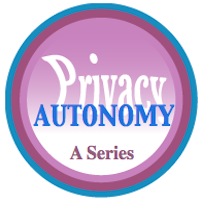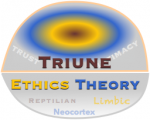 The coronavirus “pandemic” feels like some kind of turning point for humankind in terms of individual autonomy. I perceive that the response to the emergence of the virus is asymmetrical to its actual health threat, and this is leading people around the world to relinquish their individual rights on a scale I have never seen before. The coronavirus “pandemic” feels like some kind of turning point for humankind in terms of individual autonomy. I perceive that the response to the emergence of the virus is asymmetrical to its actual health threat, and this is leading people around the world to relinquish their individual rights on a scale I have never seen before.
This post discusses this event (a sign in semiotics) within the context of privacy and autonomy in the digital age. My discussion is not a conspiracy theory as I find those pointless and disempowering. I link various technology and social happenings and place their significance within the context of human nature. I also reference some neuroscience to help you understand the situation at a new level. I conclude with suggestions for action.
[…]

Africa [credit: Mapswire.com]
Africa is a nascent innovation powerhouse, and its leadership will become increasingly obvious during the coming decades, but the seeds are already visible as this post reveals: Africa’s population is exploding, and its young people are adopting tech alternatives to countries’ long-insufficient health, education, and financial infrastructure.
If you’ve been interested in international development for long, you have seen many prognostications about “Africa rising” over the years only to see them fade into oblivion. Predicting profound economic shifts is like predicting earthquakes; you study the driving forces and your algorithms crunch the data.
That isn’t stopping Helga Stegmann. She has led “user experience” agency Mantaray since 2006, and she gave a riveting talk last week in Chicago hosted by partner agency BoldInsight. In my experience, user experience folks rarely have their hands on the pulse of disruptive economic change, but the reason she is an exception reflects that Africa’s economic transformation is happening at the grassroots level (as with most revolutions), and her key orientation is user experience design, so researching users across rapidly evolving interfaces in devices. Follow along with my notes of her remarks […]

Trust and the Triune Ethics Theory reviews Darcia Narvaez’s breakthrough Triune Ethics Theory paper and draws new insights into how trust and relationship building work, based on the human brain’s evolutionary development, structure, and functions. And it sheds light on how experiential social media increases intimacy.
Triune Ethics Theory, Darcia Narvaez, Ph.D.
 Triune Ethics is an enthralling, exceedingly useful approach to understanding human behavior because it explains the context of trust and relationship building at a profound level that is actionable for anyone who wants deeper, richer, more flexible connections and collaboration with people. Triune Ethics Theory will help me to educate my clients and teams at a deep level, and it can give you a rare understanding of your own behavior—and that of people around you. Triune Ethics is an enthralling, exceedingly useful approach to understanding human behavior because it explains the context of trust and relationship building at a profound level that is actionable for anyone who wants deeper, richer, more flexible connections and collaboration with people. Triune Ethics Theory will help me to educate my clients and teams at a deep level, and it can give you a rare understanding of your own behavior—and that of people around you.
As with all my reviews, I will attempt to summarize this paper’s salient points before adding some reflections and conclusions about how I’m using its assertions in my work. As I have no formal training in neuroscience, I am drawing on lay study as well as psychology and my […]
 The Potential of Female Leadership explores what lessons we may learn from bonobos’ matriarchal social structure, so we can build stronger, more collaborative human communities and groups. Bonobo Handshake is an enthralling insightful book, which I review here. A tremendous bonus is its similarities to and significant differences from Chimpanzee Politics (reviewed yesterday). The Potential of Female Leadership explores what lessons we may learn from bonobos’ matriarchal social structure, so we can build stronger, more collaborative human communities and groups. Bonobo Handshake is an enthralling insightful book, which I review here. A tremendous bonus is its similarities to and significant differences from Chimpanzee Politics (reviewed yesterday).
Bonobo Handshake was on the same library shelf as Chimpanzee Politics, but it is a very different book, and in delightful ways. At the same time, it offers intriguing insight into bonobos’ behavior, which differs significantly from chimpanzees’ and holds interesting lessons for human societies and groups. Although Woods is not a primatologist per se, she has conducted extensive research with her husband, who is, so explaining scientific experiments forms a key part of this book.
Bonobo Handshake is rare in a surprising way. Deftly and subtly, it contrasts the joy, harmony and matriarchal structure of the bonobos with chimpanzees’ and humans’ patriarchal societies and violence: the wars in and around the two Congos result in the […]
 Unique, Insightful and Useful Guide to Business and Civil Politics reveals human political strategies through the eyes of a primatologist studying a chimpanzee community. It lays bare most of the behavior people use “to get ahead” in business and politics by explaining the evolutionary underpinnings of these behaviors, so we can appreciate them at a new level. Unique, Insightful and Useful Guide to Business and Civil Politics reveals human political strategies through the eyes of a primatologist studying a chimpanzee community. It lays bare most of the behavior people use “to get ahead” in business and politics by explaining the evolutionary underpinnings of these behaviors, so we can appreciate them at a new level.
Have you ever heard someone say, “I’m not political!”? S/He may mean well, but this book shows that one cannot be human without being “political”; moreover, it explains political behavior in hilarious, poignant ways that help the reader in multiple ways as I detail here. It is immensely entertaining to read while being scientific in its assertions.
[…]
 Use Scenarios to Network into Jobs and Contracts reveals a new way to break through when you’re looking for new consulting work or employment for yourself, or you’re fundraising for your startup or nonprofit. As these pages detail, I’ve learned that “breaking through the noise” is easy when you play music. You’ll learn how to do it here. Use Scenarios to Network into Jobs and Contracts reveals a new way to break through when you’re looking for new consulting work or employment for yourself, or you’re fundraising for your startup or nonprofit. As these pages detail, I’ve learned that “breaking through the noise” is easy when you play music. You’ll learn how to do it here.
[…]
 Customer experience and experiential social media shows how you can succeed in transforming your customers’ experiences with your firm by adopting a refreshing and effective human approach. Transforming customer experience enables most firms to become more resilient and profitable. Customer experience and experiential social media shows how you can succeed in transforming your customers’ experiences with your firm by adopting a refreshing and effective human approach. Transforming customer experience enables most firms to become more resilient and profitable.
If you’d like to watch this post instead of reading it, click the thumbnail button.
[…]
 Employee engagement and experiential social media shares my insights into one of the biggest challenges faced by business today—the employee engagement crisis, and how firms can change the game. Fewer than a quarter of employees are engaged, a slightly smaller quarter are “actively disengaged,” and the majority is blasé and punches the clock. Employee engagement and experiential social media shares my insights into one of the biggest challenges faced by business today—the employee engagement crisis, and how firms can change the game. Fewer than a quarter of employees are engaged, a slightly smaller quarter are “actively disengaged,” and the majority is blasé and punches the clock.
If you’d like to watch this post instead of reading it, click the thumbnail button.
[…]
 How to Protect Yourself from Pervasive Surveillance and Control shows how you can act to protect yourself, your family and your community from the rise of digitally enabled surveillance and control. How to Protect Yourself from Pervasive Surveillance and Control shows how you can act to protect yourself, your family and your community from the rise of digitally enabled surveillance and control.
Privacy and Autonomy in the Digital Age is a series I’m writing to share my insights into disruptive risks that we face, individually and collectively, due to the digitization of the world. As I wrote in Part1, my technology adoption crystal ball says that the convergence of pervasive digital data, smart devices and their centralized [cloud] control enables unprecedented surveillance and control of people at a very low cost. This post offers various suggestions for mitigating the risks, while Police State Scenarios (Part3) discusses ways that collective permanent loss of autonomy could unfold.
[…]
 In Healing Business, I’ll share why I think business needs healing and how CSRA is doing it with experiential social media. Business is wounded from a human point of view because it’s become very impersonal; large organizations don’t mean to, but they treat employees and customers as numbers because they don’t know or trust them. Experiential is a practical way to change that. In Healing Business, I’ll share why I think business needs healing and how CSRA is doing it with experiential social media. Business is wounded from a human point of view because it’s become very impersonal; large organizations don’t mean to, but they treat employees and customers as numbers because they don’t know or trust them. Experiential is a practical way to change that.
If you’d like to watch this post instead of reading it, click the thumbnail button!
[…]
|
|
 The coronavirus “pandemic” feels like some kind of turning point for humankind in terms of individual autonomy. I perceive that the response to the emergence of the virus is asymmetrical to its actual health threat, and this is leading people around the world to relinquish their individual rights on a scale I have never seen before.
The coronavirus “pandemic” feels like some kind of turning point for humankind in terms of individual autonomy. I perceive that the response to the emergence of the virus is asymmetrical to its actual health threat, and this is leading people around the world to relinquish their individual rights on a scale I have never seen before.


 Triune Ethics is an enthralling, exceedingly useful approach to understanding human behavior because it explains the context of trust and relationship building at a profound level that is actionable for anyone who wants deeper, richer, more flexible connections and collaboration with people. Triune Ethics Theory will help me to educate my clients and teams at a deep level, and it can give you a rare understanding of your own behavior—and that of people around you.
Triune Ethics is an enthralling, exceedingly useful approach to understanding human behavior because it explains the context of trust and relationship building at a profound level that is actionable for anyone who wants deeper, richer, more flexible connections and collaboration with people. Triune Ethics Theory will help me to educate my clients and teams at a deep level, and it can give you a rare understanding of your own behavior—and that of people around you. The Potential of Female Leadership explores what lessons we may learn from bonobos’ matriarchal social structure, so we can build stronger, more collaborative human communities and groups. Bonobo Handshake is an enthralling insightful book, which I review here. A tremendous bonus is its similarities to and significant differences from Chimpanzee Politics (reviewed yesterday).
The Potential of Female Leadership explores what lessons we may learn from bonobos’ matriarchal social structure, so we can build stronger, more collaborative human communities and groups. Bonobo Handshake is an enthralling insightful book, which I review here. A tremendous bonus is its similarities to and significant differences from Chimpanzee Politics (reviewed yesterday). Unique, Insightful and Useful Guide to Business and Civil Politics reveals human political strategies through the eyes of a primatologist studying a chimpanzee community. It lays bare most of the behavior people use “to get ahead” in business and politics by explaining the evolutionary underpinnings of these behaviors, so we can appreciate them at a new level.
Unique, Insightful and Useful Guide to Business and Civil Politics reveals human political strategies through the eyes of a primatologist studying a chimpanzee community. It lays bare most of the behavior people use “to get ahead” in business and politics by explaining the evolutionary underpinnings of these behaviors, so we can appreciate them at a new level. Use Scenarios to Network into Jobs and Contracts reveals a new way to break through when you’re looking for new consulting work or employment for yourself, or you’re fundraising for your startup or nonprofit. As these pages detail, I’ve learned that “breaking through the noise” is easy when you play music. You’ll learn how to do it here.
Use Scenarios to Network into Jobs and Contracts reveals a new way to break through when you’re looking for new consulting work or employment for yourself, or you’re fundraising for your startup or nonprofit. As these pages detail, I’ve learned that “breaking through the noise” is easy when you play music. You’ll learn how to do it here. Customer experience and experiential social media shows how you can succeed in transforming your customers’ experiences with your firm by adopting a refreshing and effective human approach. Transforming customer experience enables most firms to become more resilient and profitable.
Customer experience and experiential social media shows how you can succeed in transforming your customers’ experiences with your firm by adopting a refreshing and effective human approach. Transforming customer experience enables most firms to become more resilient and profitable. Employee engagement and experiential social media shares my insights into one of the biggest challenges faced by business today—the employee engagement crisis, and how firms can change the game. Fewer than a quarter of employees are engaged, a slightly smaller quarter are “actively disengaged,” and the majority is blasé and punches the clock.
Employee engagement and experiential social media shares my insights into one of the biggest challenges faced by business today—the employee engagement crisis, and how firms can change the game. Fewer than a quarter of employees are engaged, a slightly smaller quarter are “actively disengaged,” and the majority is blasé and punches the clock. How to Protect Yourself from Pervasive Surveillance and Control shows how you can act to protect yourself, your family and your community from the rise of digitally enabled surveillance and control.
How to Protect Yourself from Pervasive Surveillance and Control shows how you can act to protect yourself, your family and your community from the rise of digitally enabled surveillance and control. In Healing Business, I’ll share why I think business needs healing and how CSRA is doing it with experiential social media. Business is wounded from a human point of view because it’s become very impersonal; large organizations don’t mean to, but they treat employees and customers as numbers because they don’t know or trust them. Experiential is a practical way to change that.
In Healing Business, I’ll share why I think business needs healing and how CSRA is doing it with experiential social media. Business is wounded from a human point of view because it’s become very impersonal; large organizations don’t mean to, but they treat employees and customers as numbers because they don’t know or trust them. Experiential is a practical way to change that.